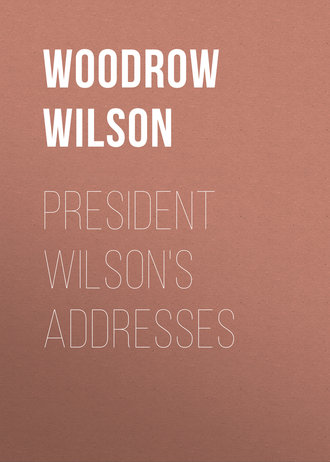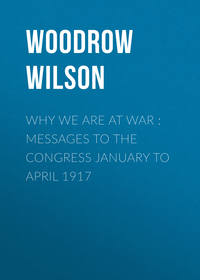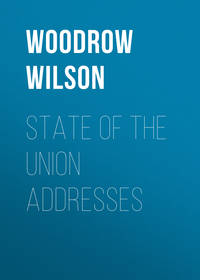 полная версия
полная версияPresident Wilson's Addresses
This decision I have arrived at with the keenest regret; the possibility of the action contemplated I am sure all thoughtful Americans will look forward to with unaffected reluctance. But we cannot forget that we are in some sort and by the force of circumstances the responsible spokesmen of the rights of humanity, and that we cannot remain silent while those rights seem in process of being swept utterly away in the maelstrom of this terrible war. We owe it to a due regard for our own rights as a nation, to our sense of duty as a representative of the rights of neutrals the world over, and to a just conception of the rights of mankind to take this stand now with the utmost solemnity and firmness.
I have taken it, and taken it in the confidence that it will meet with your approval and support. All sober-minded men must unite in hoping that the Imperial German Government, which has in other circumstances stood as the champion of all that we are now contending for in the interest of humanity, may recognize the justice of our demands and meet them in the spirit in which they are made.
AMERICAN PRINCIPLES
[Address delivered at the First Annual Assemblage of the League to Enforce Peace, May 27, 1916.]
When the invitation to be here to-night came to me, I was glad to accept it,—not because it offered me an opportunity to discuss the program of the League,—that you will, I am sure, not expect of me,—but because the desire of the whole world now turns eagerly, more and more eagerly, towards the hope of peace, and there is just reason why we should take our part in counsel upon this great theme. It is right that I, as spokesman of our Government, should attempt to give expression to what I believe to be the thought and purpose of the people of the United States in this vital matter.
This great war that broke so suddenly upon the world two years ago, and which has swept within its flame so great a part of the civilized world, has affected us very profoundly, and we are not only at liberty, it is perhaps our duty, to speak very frankly of it and of the great interests of civilization which it affects.
With its causes and its objects we are not concerned. The obscure fountains from which its stupendous flood has burst forth we are not interested to search for or explore. But so great a flood, spread far and wide to every quarter of the globe, has of necessity engulfed many a fair province of right that lies very near to us. Our own rights as a Nation, the liberties, the privileges, and the property of our people have been profoundly affected. We are not mere disconnected lookers-on. The longer the war lasts, the more deeply do we become concerned that it should be brought to an end and the world be permitted to resume its normal life and course again. And when it does come to an end we shall be as much concerned as the nations at war to see peace assume an aspect of permanence, give promise of days from which the anxiety of uncertainty shall be lifted, bring some assurance that peace and war shall always hereafter be reckoned part of the common interest of mankind. We are participants, whether we would or not, in the life of the world. The interests of all nations are our own also. We are partners with the rest. What affects mankind is inevitably our affair as well as the affair of the nations of Europe and of Asia.
One observation on the causes of the present war we are at liberty to make, and to make it may throw some light forward upon the future, as well as backward upon the past. It is plain that this war could have come only as it did, suddenly and out of secret counsels, without warning to the world, without discussion, without any of the deliberate movements of counsel with which it would seem natural to approach so stupendous a contest. It is probable that if it had been foreseen just what would happen, just what alliances would be formed, just what forces arrayed against one another, those who brought the great contest on would have been glad to substitute conference for force. If we ourselves had been afforded some opportunity to apprise the belligerents of the attitude which it would be our duty to take, of the policies and practices against which we would feel bound to use all our moral and economic strength, and in certain circumstances even our physical strength also, our own contribution to the counsel which might have averted the struggle would have been considered worth weighing and regarding.
And the lesson which the shock of being taken by surprise in a matter so deeply vital to all the nations of the world has made poignantly clear is, that the peace of the world must henceforth depend upon a new and more wholesome diplomacy. Only when the great nations of the world have reached some sort of agreement as to what they hold to be fundamental to their common interest, and as to some feasible method of acting in concert when any nation or group of nations seeks to disturb those fundamental things, can we feel that civilization is at last in a way of justifying its existence and claiming to be finally established. It is clear that nations must in the future be governed by the same high code of honor that we demand of individuals.
We must, indeed, in the very same breath with which we avow this conviction admit that we have ourselves upon occasion in the past been offenders against the law of diplomacy which we thus forecast; but our conviction is not the less clear, but rather the more clear, on that account. If this war has accomplished nothing else for the benefit of the world, it has at least disclosed a great moral necessity and set forward the thinking of the statesmen of the world by a whole age. Repeated utterances of the leading statesmen of most of the great nations now engaged in war have made it plain that their thought has come to this, that the principle of public right must henceforth take precedence over the individual interests of particular nations, and that the nations of the world must in some way band themselves together to see that that right prevails as against any sort of selfish aggression; that henceforth alliance must not be set up against alliance, understanding against understanding, but that there must be a common agreement for a common object, and that at the heart of that common object must lie the inviolable rights of peoples and of mankind. The nations of the world have become each other's neighbors. It is to their interest that they should understand each other. In order that they may understand each other, it is imperative that they should agree to coöperate in a common cause, and that they should so act that the guiding principle of that common cause shall be even-handed and impartial justice.
This is undoubtedly the thought of America. This is what we ourselves will say when there comes proper occasion to say it. In the dealings of nations with one another arbitrary force must be rejected and we must move forward to the thought of the modern world, the thought of which peace is the very atmosphere. That thought constitutes a chief part of the passionate conviction of America.
We believe these fundamental things: First, that every people has a right to choose the sovereignty under which they shall live. Like other nations, we have ourselves no doubt once and again offended against that principle when for a little while controlled by selfish passion, as our franker historians have been honorable enough to admit; but it has become more and more our rule of life and action. Second, that the small states of the world have a right to enjoy the same respect for their sovereignty and for their territorial integrity that great and powerful nations expect and insist upon. And, third, that the world has a right to be free from every disturbance of its peace that has its origin in aggression and disregard of the rights of peoples and nations.
So sincerely do we believe in these things that I am sure that I speak the mind and wish of the people of America when I say that the United States is willing to become a partner in any feasible association of nations formed in order to realize these objects and make them secure against violation.
There is nothing that the United States wants for itself that any other nation has. We are willing, on the contrary, to limit ourselves along with them to a prescribed course of duty and respect for the rights of others which will check any selfish passion of our own, as it will check any aggressive impulse of theirs.
If it should ever be our privilege to suggest or initiate a movement for peace among the nations now at war, I am sure that the people of the United States would wish their Government to move along these lines: First, such a settlement with regard to their own immediate interests as the belligerents may agree upon. We have nothing material of any kind to ask for ourselves, and are quite aware that we are in no sense or degree parties to the present quarrel. Our interest is only in peace and its future guarantees. Second, an universal association of the nations to maintain the inviolate security of the highway of the seas for the common and unhindered use of all the nations of the world, and to prevent any war begun either contrary to treaty covenants or without warning and full submission of the causes to the opinion of the world,—a virtual guarantee of territorial integrity and political independence.
But I did not come here, let me repeat, to discuss a program. I came only to avow a creed and give expression to the confidence I feel that the world is even now upon the eve of a great consummation, when some common force will be brought into existence which shall safeguard right as the first and most fundamental interest of all peoples and all governments, when coercion shall be summoned not to the service of political ambition or selfish hostility, but to the service of a common order, a common justice, and a common peace. God grant that the dawn of that day of frank dealing and of settled peace, concord, and coöperation may be near at hand!
THE DEMANDS OF RAILWAY EMPLOYEES
[Address delivered at a joint session of the two Houses of Congress, August 29, 1916.]
Gentlemen of the Congress:
I have come to you to seek your assistance in dealing with a very grave situation which has arisen out of the demand of the employees of the railroads engaged in freight train service that they be granted an eight-hour working day, safeguarded by payment for an hour and a half of service for every hour of work beyond the eight.
The matter has been agitated for more than a year. The public has been made familiar with the demands of the men and the arguments urged in favor of them, and even more familiar with the objections of the railroads and their counter demand that certain privileges now enjoyed by their men and certain bases of payment worked out through many years of contest be reconsidered, especially in their relation to the adoption of an eight-hour day. The matter came some three weeks ago to a final issue and resulted in a complete deadlock between the parties. The means provided by law for the mediation of the controversy failed and the means of arbitration for which the law provides were rejected. The representatives of the railway executives proposed that the demands of the men be submitted in their entirety to arbitration, along with certain questions of readjustment as to pay and conditions of employment which seemed to them to be either closely associated with the demands or to call for reconsideration on their own merits; the men absolutely declined arbitration, especially if any of their established privileges were by that means to be drawn again in question. The law in the matter put no compulsion upon them. The four hundred thousand men from whom the demands proceeded had voted to strike if their demands were refused; the strike was imminent; it has since been set for the fourth of September next. It affects the men who man the freight trains on practically every railway in the country. The freight service throughout the United States must stand still until their places are filled, if, indeed, it should prove possible to fill them at all. Cities will be cut off from their food supplies, the whole commerce of the nation will be paralyzed, men of every sort and occupation will be thrown out of employment, countless thousands will in all likelihood be brought, it may be, to the very point of starvation, and a tragical national calamity brought on, to be added to the other distresses of the time, because no basis of accommodation or settlement has been found.
Just so soon as it became evident that mediation under the existing law had failed and that arbitration had been rendered impossible by the attitude of the men, I considered it my duty to confer with the representatives of both the railways and the brotherhoods, and myself offer mediation, not as an arbitrator, but merely as spokesman of the nation, in the interest of justice, indeed, and as a friend of both parties, but not as judge, only as the representative of one hundred millions of men, women, and children who would pay the price, the incalculable price, of loss and suffering should these few men insist upon approaching and concluding the matters in controversy between them merely as employers and employees, rather than as patriotic citizens of the United States looking before and after and accepting the larger responsibility which the public would put upon them.
It seemed to me, in considering the subject-matter of the controversy, that the whole spirit of the time and the preponderant evidence of recent economic experience spoke for the eight-hour day. It has been adjudged by the thought and experience of recent years a thing upon which society is justified in insisting as in the interest of health, efficiency, contentment, and a general increase of economic vigor. The whole presumption of modern experience would, it seemed to me, be in its favor, whether there was arbitration or not, and the debatable points to settle were those which arose out of the acceptance of the eight-hour day rather than those which affected its establishment. I, therefore, proposed that the eight-hour day be adopted by the railway managements and put into practice for the present as a substitute for the existing ten-hour basis of pay and service; that I should appoint, with the permission of the Congress, a small commission to observe the results of the change, carefully studying the figures of the altered operating costs, not only, but also the conditions of labor under which the men worked and the operation of their existing agreements with the railroads, with instructions to report the facts as they found them to the Congress at the earliest possible day, but without recommendation; and that, after the facts had been thus disclosed, an adjustment should in some orderly manner be sought of all the matters now left unadjusted between the railroad managers and the men.
These proposals were exactly in line, it is interesting to note, with the position taken by the Supreme Court of the United States when appealed to to protect certain litigants from the financial losses which they confidently expected if they should submit to the regulation of their charges and of their methods of service by public legislation. The Court has held that it would not undertake to form a judgment upon forecasts, but could base its action only upon actual experience; that it must be supplied with facts, not with calculations and opinions, however scientifically attempted. To undertake to arbitrate the question of the adoption of an eight-hour day in the light of results merely estimated and predicted would be to undertake an enterprise of conjecture. No wise man could undertake it, or, if he did undertake it, could feel assured of his conclusions.
I unhesitatingly offered the friendly services of the administration to the railway managers to see to it that justice was done the railroads in the outcome. I felt warranted in assuring them that no obstacle of law would be suffered to stand in the way of their increasing their revenues to meet the expenses resulting from the change so far as the development of their business and of their administrative efficiency did not prove adequate to meet them. The public and the representatives of the public, I felt justified in assuring them, were disposed to nothing but justice in such cases and were willing to serve those who served them.
The representatives of the brotherhoods accepted the plan; but the representatives of the railroads declined to accept it. In the face of what I cannot but regard as the practical certainty that they will be ultimately obliged to accept the eight-hour day by the concerted action of organized labor, backed by the favorable judgment of society, the representatives of the railway management have felt justified in declining a peaceful settlement which would engage all the forces of justice, public and private, on their side to take care of the event. They fear the hostile influence of shippers, who would be opposed to an increase of freight rates (for which, however, of course, the public itself would pay); they apparently feel no confidence that the Interstate Commerce Commission could withstand the objections that would be made. They do not care to rely upon the friendly assurances of the Congress or the President. They have thought it best that they should be forced to yield, if they must yield, not by counsel, but by the suffering of the country. While my conferences with them were in progress, and when to all outward appearance those conferences had come to a standstill, the representatives of the brotherhoods suddenly acted and set the strike for the fourth of September.
The railway managers based their decision to reject my counsel in this matter upon their conviction that they must at any cost to themselves or to the country stand firm for the principle of arbitration which the men had rejected. I based my counsel upon the indisputable fact that there was no means of obtaining arbitration. The law supplied none; earnest efforts at mediation had failed to influence the men in the least. To stand firm for the principle of arbitration and yet not get arbitration seemed to me futile, and something more than futile, because it involved incalculable distress to the country and consequences in some respects worse than those of war, and that in the midst of peace.
I yield to no man in firm adherence, alike of conviction and of purpose, to the principle of arbitration in industrial disputes; but matters have come to a sudden crisis in this particular dispute and the country had been caught unprovided with any practicable means of enforcing that conviction in practice (by whose fault we will not now stop to inquire). A situation had to be met whose elements and fixed conditions were indisputable. The practical and patriotic course to pursue, as it seemed to me, was to secure immediate peace by conceding the one thing in the demands of the men which society itself and any arbitrators who represented public sentiment were most likely to approve, and immediately lay the foundations for securing arbitration with regard to everything else involved. The event has confirmed that judgment.
I was seeking to compose the present in order to safeguard the future; for I wished an atmosphere of peace and friendly coöperation in which to take counsel with the representatives of the nation with regard to the best means for providing, so far as it might prove possible to provide, against the recurrence of such unhappy situations in the future,—the best and most practicable means of securing calm and fair arbitration of all industrial disputes in the days to come. This is assuredly the best way of vindicating a principle, namely, having failed to make certain of its observance in the present, to make certain of its observance in the future.
But I could only propose. I could not govern the will of others who took an entirely different view of the circumstances of the case, who even refused to admit the circumstances to be what they have turned out to be.
Having failed to bring the parties to this critical controversy to an accommodation, therefore, I turn to you, deeming it clearly our duty as public servants to leave nothing undone that we can do to safeguard the life and interests of the nation. In the spirit of such a purpose, I earnestly recommend the following legislation:
First, immediate provision for the enlargement and administrative reorganization of the Interstate Commerce Commission along the lines embodied in the bill recently passed by the House of Representatives and now awaiting action by the Senate; in order that the Commission may be enabled to deal with the many great and various duties now devolving upon it with a promptness and thoroughness which are with its present constitution and means of action practically impossible.
Second, the establishment of an eight-hour day as the legal basis alike of work and of wages in the employment of all railway employees who are actually engaged in the work of operating trains in interstate transportation.
Third, the authorization of the appointment by the President of a small body of men to observe the actual results in experience of the adoption of the eight-hour day in railway transportation alike for the men and for the railroads; its effects in the matter of operating costs, in the application of the existing practices and agreements to the new conditions, and in all other practical aspects, with the provision that the investigators shall report their conclusions to the Congress at the earliest possible date, but without recommendation as to legislative action; in order that the public may learn from an unprejudiced source just what actual developments have ensued.
Fourth, explicit approval by the Congress of the consideration by the Interstate Commerce Commission of an increase of freight rates to meet such additional expenditures by the railroads as may have been rendered necessary by the adoption of the eight-hour day and which have not been offset by administrative readjustments and economies, should the facts disclosed justify the increase.
Fifth, an amendment of the existing federal statute which provides for the mediation, conciliation, and arbitration of such controversies as the present by adding to it a provision that in case the methods of accommodation now provided for should fail, a full public investigation of the merits of every such dispute shall be instituted and completed before a strike or lockout may lawfully be attempted.
And, sixth, the lodgment in the hands of the Executive of the power, in case of military necessity, to take control of such portions and such rolling stock of the railways of the country as may be required for military use and to operate them for military purposes, with authority to draft into the military service of the United States such train crews and administrative officials as the circumstances require for their safe and efficient use.
This last suggestion I make because we cannot in any circumstances suffer the nation to be hampered in the essential matter of national defense. At the present moment circumstances render this duty particularly obvious. Almost the entire military force of the nation is stationed upon the Mexican border to guard our territory against hostile raids. It must be supplied, and steadily supplied, with whatever it needs for its maintenance and efficiency. If it should be necessary for purposes of national defense to transfer any portion of it upon short notice to some other part of the country, for reasons now unforeseen, ample means of transportation must be available, and available without delay. The power conferred in this matter should be carefully and explicitly limited to cases of military necessity, but in all such cases it should be clear and ample.
There is one other thing we should do if we are true champions of arbitration. We should make all arbitral awards judgments by record of a court of law in order that their interpretation and enforcement may lie, not with one of the parties to the arbitration, but with an impartial and authoritative tribunal.
These things I urge upon you, not in haste or merely as a means of meeting a present emergency, but as permanent and necessary additions to the law of the land, suggested, indeed, by circumstances we had hoped never to see, but imperative as well as just, if such emergencies are to be prevented in the future. I feel that no extended argument is needed to commend them to your favorable consideration. They demonstrate themselves. The time and the occasion only give emphasis to their importance. We need them now and we shall continue to need them.







